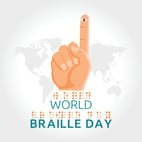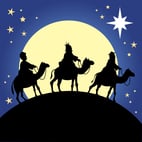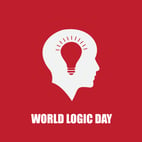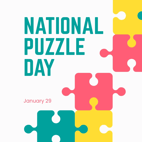Cheers to the new beginnings! This January, we will embark on a vibrant educational journey exploring values and celebrations tailored for our young learners. This month, our spotlight shines on the Value of Courtesy (礼), aiming to instill kindness, respect, and empathy through engaging activities and discussions. As we step into the New Year (元旦), we embrace the concept of fresh beginnings, encouraging our little ones to discover traditions associated with the turn of the year. Exploring the Laba Festival (腊八节) invites children to delve into cultural customs, stories, and festive foods. Energy Saving Week (节能周) presents an opportunity to instill eco-friendly habits and environmental consciousness. Additionally, National Puzzle Day (拼图日) encourages problem-solving, creativity, and teamwork through a series of engaging activities. Join us in this enriching journey through January's diverse topics, nurturing well-rounded and thoughtful young minds.
| January Educational Assets | January Festival Overview | January Language List | January Festivals Character Cards |
 1st January - New Year's Day - The New Year, a global celebration of fresh beginnings, marks the commencement of a brand-new chapter in the calendar. It's a time when diverse cultures worldwide welcome the coming year with jubilant festivities, sparkling fireworks, and joyful gatherings, symbolizing hope, renewal, and the embrace of exciting opportunities. Families and communities unite, bidding farewell to the past and eagerly embracing the dawn of a promising future with resolutions, traditions, and cheerful revelry.
1st January - New Year's Day - The New Year, a global celebration of fresh beginnings, marks the commencement of a brand-new chapter in the calendar. It's a time when diverse cultures worldwide welcome the coming year with jubilant festivities, sparkling fireworks, and joyful gatherings, symbolizing hope, renewal, and the embrace of exciting opportunities. Families and communities unite, bidding farewell to the past and eagerly embracing the dawn of a promising future with resolutions, traditions, and cheerful revelry. 4th January - World Braille Day - Braille is a tactile representation of alphabetic and numerical symbols using six dots to represent each letter and number, and even musical, mathematical and scientific symbols. Braille (named after its inventor in 19th century France, Louis Braille) is used by blind and partially sighted people to read the same books and periodicals as those printed in a visual font. Braille is essential in the context of education, freedom of expression and opinion, as well as social inclusion, as reflected in article 2 of the Convention on the Rights of Persons with Disabilities.
4th January - World Braille Day - Braille is a tactile representation of alphabetic and numerical symbols using six dots to represent each letter and number, and even musical, mathematical and scientific symbols. Braille (named after its inventor in 19th century France, Louis Braille) is used by blind and partially sighted people to read the same books and periodicals as those printed in a visual font. Braille is essential in the context of education, freedom of expression and opinion, as well as social inclusion, as reflected in article 2 of the Convention on the Rights of Persons with Disabilities.
 5th January - Twelfth Night Of Christmas - Twelfth Night is a Christian festival on the last night of the Twelve Days of Christmas, marking the coming of the Epiphany. Different traditions mark the date of Twelfth Night as either 5 January or 6 January, depending on whether the counting begins on Christmas Day or 26 December.
5th January - Twelfth Night Of Christmas - Twelfth Night is a Christian festival on the last night of the Twelve Days of Christmas, marking the coming of the Epiphany. Different traditions mark the date of Twelfth Night as either 5 January or 6 January, depending on whether the counting begins on Christmas Day or 26 December.

 14th January - World Logic Day - The ability to think is one of the most defining features of humankind. In different cultures, the definition of humanity is associated with concepts such as consciousness, knowledge and reason. According to the classic western tradition, human beings are defined as “rational” or “logical animals”. Logic, as the investigation on the principles of reasoning, has been studied by many civilizations throughout history and, since its earliest formulations, logic has played an important role in the development of philosophy and the sciences. Read more here
14th January - World Logic Day - The ability to think is one of the most defining features of humankind. In different cultures, the definition of humanity is associated with concepts such as consciousness, knowledge and reason. According to the classic western tradition, human beings are defined as “rational” or “logical animals”. Logic, as the investigation on the principles of reasoning, has been studied by many civilizations throughout history and, since its earliest formulations, logic has played an important role in the development of philosophy and the sciences. Read more here 15th January - Martin Luther King Day - A day marking the life of the celebrated civil rights campaigner, Dr Martin Luther King, Jr. He was actually born on January 15th, but because the day is a national holiday in the US, it falls on the third Monday of every January. Dr King was tragically assassinated at the age of 39 in 1968. Despite his short life, King’s non-violent activism had profound effects on the political landscape of America. To this day he is revered for his work against racial segregation, poverty, and the Vietnam War.
15th January - Martin Luther King Day - A day marking the life of the celebrated civil rights campaigner, Dr Martin Luther King, Jr. He was actually born on January 15th, but because the day is a national holiday in the US, it falls on the third Monday of every January. Dr King was tragically assassinated at the age of 39 in 1968. Despite his short life, King’s non-violent activism had profound effects on the political landscape of America. To this day he is revered for his work against racial segregation, poverty, and the Vietnam War. 17th to 23rd January - Energy Saving Week - Big Energy Saving Week 2024 is a week-long initiative that focuses on empowering people to take control of their energy consumption and make informed decisions about energy usage. It provides guidance on how to reduce energy waste, improve home insulation, and access financial support for energy bills. Participating in Big Energy Saving Week is easy and can lead to long-term savings. Here are some ways to get involved.
17th to 23rd January - Energy Saving Week - Big Energy Saving Week 2024 is a week-long initiative that focuses on empowering people to take control of their energy consumption and make informed decisions about energy usage. It provides guidance on how to reduce energy waste, improve home insulation, and access financial support for energy bills. Participating in Big Energy Saving Week is easy and can lead to long-term savings. Here are some ways to get involved. 18th January - Laba Festival - The Laba Festival comes from a traditional Chinese festival celebrated on the eighth day of the twelfth month of the lunar calendar. "La" means 12th lunar month and eight is pronounced as "ba" in Chinese. Therefore, it is named "Laba." Before the Qin dynasty the Laba festival was a celebration of the new harvest. After Buddhism spread to China during the first century CE, the festival was used as commemoration of Gautama Buddha's enlightenment at the age of 35.Traditionally, the consumption of Laba congee was an important element of the festival and the other custom is Laba Garlic.
18th January - Laba Festival - The Laba Festival comes from a traditional Chinese festival celebrated on the eighth day of the twelfth month of the lunar calendar. "La" means 12th lunar month and eight is pronounced as "ba" in Chinese. Therefore, it is named "Laba." Before the Qin dynasty the Laba festival was a celebration of the new harvest. After Buddhism spread to China during the first century CE, the festival was used as commemoration of Gautama Buddha's enlightenment at the age of 35.Traditionally, the consumption of Laba congee was an important element of the festival and the other custom is Laba Garlic. | Laba Festival Resources | Laba Festival Overview | Laba Festival Story Video | Laba Festival Cook Together Ingredients |
 24th January - International Day of Education - Education is a human right, a public good and a public responsibility. The United Nations General Assembly proclaimed 24 January as International Day of Education, in celebration of the role of education for peace and development. Without inclusive and equitable quality education and lifelong opportunities for all, countries will not succeed in achieving gender equality and breaking the cycle of poverty that is leaving millions of children, youth and adults behind. Today, 250 million children and youth are out of school, and 763 million adults are illiterate. Their right to education is being violated and it is unacceptable. It's time to transform education.
24th January - International Day of Education - Education is a human right, a public good and a public responsibility. The United Nations General Assembly proclaimed 24 January as International Day of Education, in celebration of the role of education for peace and development. Without inclusive and equitable quality education and lifelong opportunities for all, countries will not succeed in achieving gender equality and breaking the cycle of poverty that is leaving millions of children, youth and adults behind. Today, 250 million children and youth are out of school, and 763 million adults are illiterate. Their right to education is being violated and it is unacceptable. It's time to transform education. 25th January: Burns Night - Burns night is the joyous Scottish celebration that commemorates the great Scottish poet Robert Burns. Held on the 25th of January, the day is centred on ‘Burns Supper’ where haggis, neeps and tatties (mashed potatoes and parsnips) are eaten, whiskey is drunk and Burn’s poems are recited. The night has a ritual element in which poems are recited at certain times with Burn’s ‘Address to a Haggis’ coming just before the haggis is served.
25th January: Burns Night - Burns night is the joyous Scottish celebration that commemorates the great Scottish poet Robert Burns. Held on the 25th of January, the day is centred on ‘Burns Supper’ where haggis, neeps and tatties (mashed potatoes and parsnips) are eaten, whiskey is drunk and Burn’s poems are recited. The night has a ritual element in which poems are recited at certain times with Burn’s ‘Address to a Haggis’ coming just before the haggis is served.
 27th January - Holocaust Memorial Day - Holocaust Memorial Day (HMD) is marked each year on 27 January, the anniversary of the liberation of the Nazi extermination and concentration camp at Auschwitz-Birkenau in 1945. HMD seeks to highlight the importance of understanding and combating the processes that led to the mass extermination of Jews during World War II, and to recognise that the type of behaviour demonstrated in Nazi Germany was not unique either to Germany or to a particular point in history. More recent events in Cambodia, Bosnia, Rwanda and Darfur amply demonstrate the propensity of human beings to engage in mass murder.
27th January - Holocaust Memorial Day - Holocaust Memorial Day (HMD) is marked each year on 27 January, the anniversary of the liberation of the Nazi extermination and concentration camp at Auschwitz-Birkenau in 1945. HMD seeks to highlight the importance of understanding and combating the processes that led to the mass extermination of Jews during World War II, and to recognise that the type of behaviour demonstrated in Nazi Germany was not unique either to Germany or to a particular point in history. More recent events in Cambodia, Bosnia, Rwanda and Darfur amply demonstrate the propensity of human beings to engage in mass murder. 29th January - National Puzzle Day - Celebrated on 29th January, National Puzzle Day recognizes the value of puzzles and how they can benefit our mental development. It was started in 2002 by Jodi Jill as a way for her to share her enjoyment of puzzles. It has gone on to grow in popularity year on year. In addition, puzzles also have the added benefit of being a great social tool. Solving problems with others provides a healthy and productive way to interact with people. Whether it’s with a partner or larger group, these interactions can keep children socially active, whilst providing them with the necessary social skills to thrive.
29th January - National Puzzle Day - Celebrated on 29th January, National Puzzle Day recognizes the value of puzzles and how they can benefit our mental development. It was started in 2002 by Jodi Jill as a way for her to share her enjoyment of puzzles. It has gone on to grow in popularity year on year. In addition, puzzles also have the added benefit of being a great social tool. Solving problems with others provides a healthy and productive way to interact with people. Whether it’s with a partner or larger group, these interactions can keep children socially active, whilst providing them with the necessary social skills to thrive.
30-Dec-2023 18:54:56
Related Articles





Write a Comment